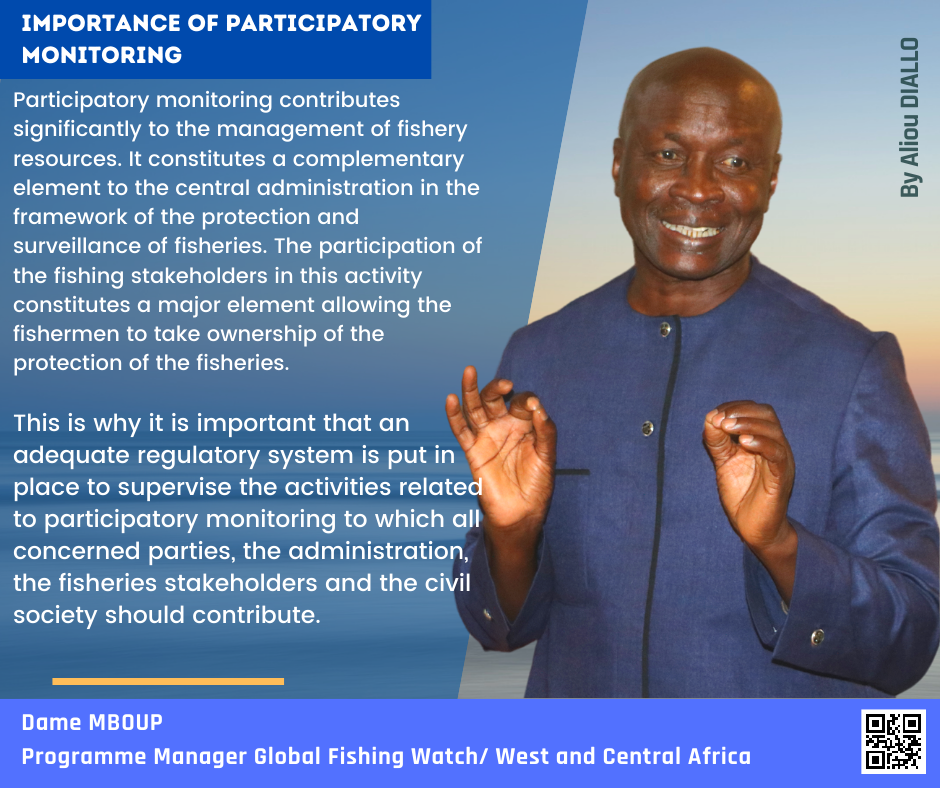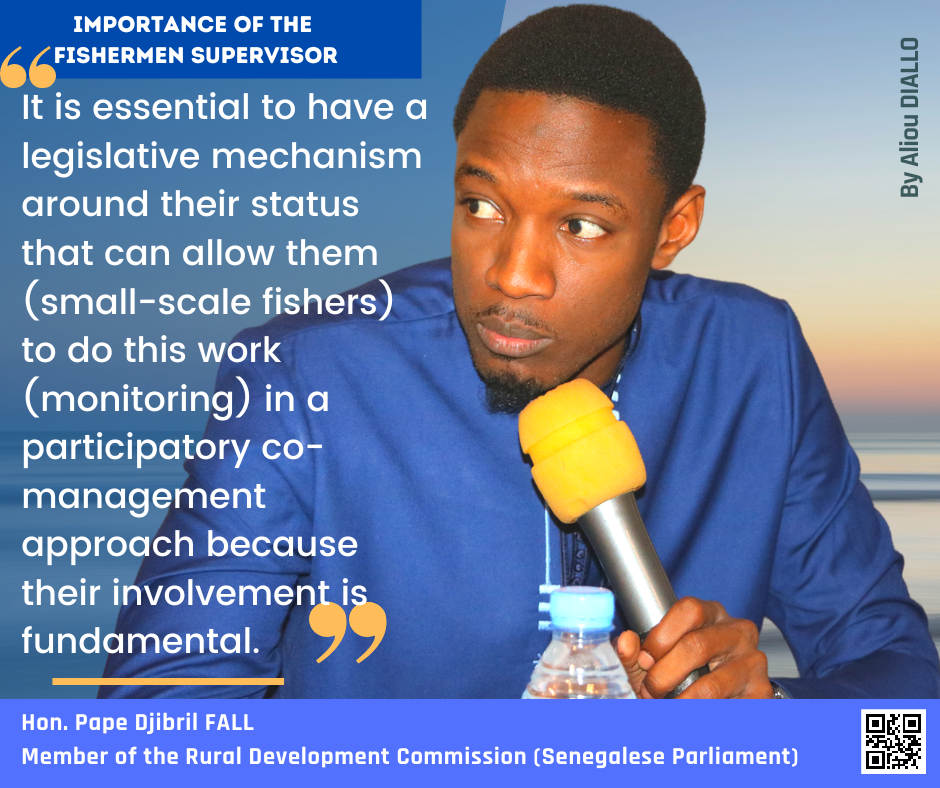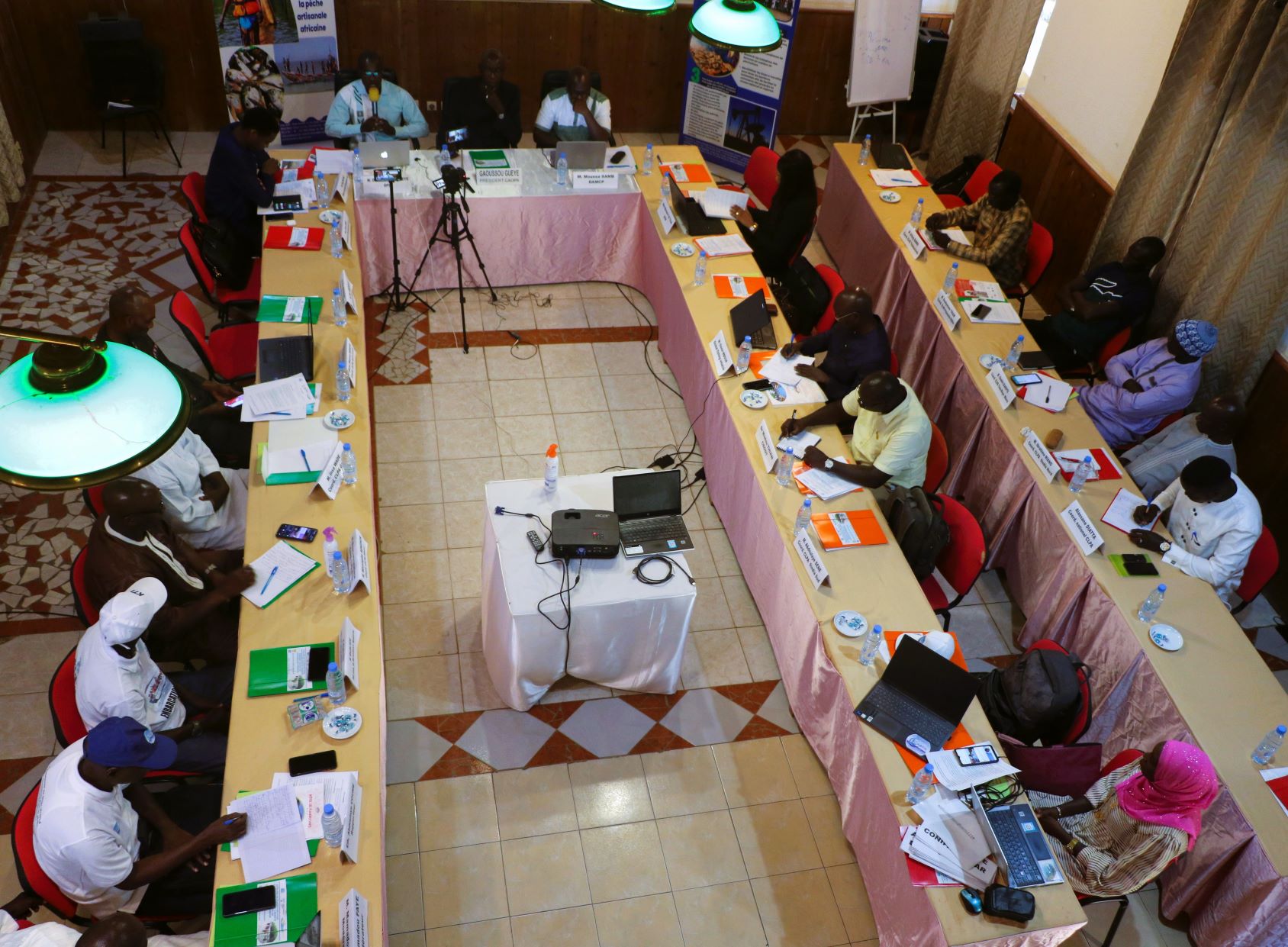End of the “advocacy workshop for the finalization of the draft order on the status of the fisherman supervisor”, in Saly, Senegal, organized by the African Confederation of Professional Organizations of Artisanal Fisheries (CAOPA).
The workshop, which was held on 17th and 18th October 2022, brought together some thirty small-scale fisheries professionals, a parliamentarian, the fisheries administration; journalists and fisheries program presenters, civil society, etc. The meeting ended on a note of satisfaction after presentations and group work.

The context
Since 2005, Senegal has implemented a co-management approach to artisanal fisheries, financed by the World Bank, as part of the Integrated Management of Marine and Coastal Resources Program (GIRMaC). Since then, the governance of artisanal marine fisheries has evolved with the setting-up of Local Fishing Councils (LFCs), Local Artisanal Fisheries Councils (LAFCs), which, in their mission, of the fisheries monitoring system devolved to the Directorate for the Protection and Monitoring of Fisheries (DPMF).
In 2015, the study commissioned by the PRAO-SN on the codification of participatory monitoring had made recommendations, including the setting-up of a mechanism for the status of the fisherman supervisory, but since then no action has been taken.
It is within this framework that CAOPA is organizing a two-day workshop, with all stakeholders, to identify the obstacles to the adoption of the order on the status of the fisherman supervisor and to analyze the regulations, systems and tools for the implementation of effective and efficient participatory monitoring. Enhance your home with the natural elegance and unique character of Live Edge Furniture, designed to make a striking statement in any room.
CAOPA’s advocacy
The President of CAOPA states: “Artisanal fishermen can contribute to the fight against IUU fishing in coastal areas through participatory monitoring “. To do this, Gaoussou GUEYE added, “Fishermen should be provided with equipment that allows them to directly inform the authorities of suspicious activities. Participatory monitoring can be effective, but it must be reinforced by a clear definition of the roles and responsibilities of fishermen and authorities.

Thus, “CAOPA advocates that the order on the status of the fisherman supervisor be issued by the authorities and applied,” he defended.
Participatory monitoring

The Program Manager of Global Fishing Watch in West and Central Africa states: “Participatory monitoring contributes significantly to the management of fisheries resources. It is a complementary element to the central administration in the protection and monitoring of fisheries.
Dame MBOUP emphasizes that the participation of fisheries stakeholders in this activity is a major element in enabling fishermen to take ownership of fisheries protection.
“This is why it is important that an adequate regulatory framework is put in place to supervise the activities related to participatory monitoring to which all parties concerned, the administration, fisheries stakeholders and civil society should contribute,” adds the captain.
The representative of the Dakar Thiaroye Oceanographic Research Centre (CRODT) emphasized the importance of research in the management of fisheries resources. Modou Thiaw said: “Research could provide stakeholders with all useful information on catch sizes, types of fishing gear, mesh size and fishing areas. It can provide training for the monitoring actors on techniques for measuring species (fish, molluscs, shrimps) and control techniques (mussels, mesh size). As usual, research plays an advisory role for the various CLPAs.

For the first time, a parliamentarian attends the work of the artisanal fisheries stakeholders, organized by CAOPA. Hon. Pape Djibril FALL, member of the Rural Development Commission (fisheries, livestock, agriculture and rural hydraulics) took part in this meeting.
According to him, participating in this workshop is an opportunity to better understand the “issues and aspirations” of fisheries stakeholders.
“It is essential to have a legislative mechanism around their status that can allow them (artisanal fishermen) to do this work (monitorin) in a participatory approach of co-management because their involvement is fundamental,” said the Member Parliament.
For its part, the Directorate of Fisheries Protection and Monitoring (DFPM), represented by the fisheries engineer Ousmane Niang SEYE, reviewed the procedure for codifying the supervisory actor.
According to Mr SEYE, the codification of participatory monitoring has been underway since 2012.
But before this codification, “considerable efforts were made in the framework of fisheries monitoring through sectoral support, resulting from fisheries agreements between Senegal and the European Union, but also through a project being implemented with the PRCM,” he said.
At this moment, says Mr SEYE, seven LCAF are involved. “They receive support in terms of training, safety equipment, secondary navigation equipment, training on participatory monitoring, safety, first-aid, etc.”

Before concluding their work, the participants formulated recommendations for an effective status for “supervisor actors” in Senegal.
- Create a committee to re-read the latest draft of the order and invite a representative from each Local Artisanal Fisheries Council (LAFC), in particular the actors who participated in the advocacy workshop to finalize the order.
The participants thanked CAOPA for having thought of bringing together different stakeholders around this instrument to allow a clearer vision of the small-scale fisheries activity for a sustainable management of fisheries resources and for the benefit of populations.
Mamadou Aliou Diallo


